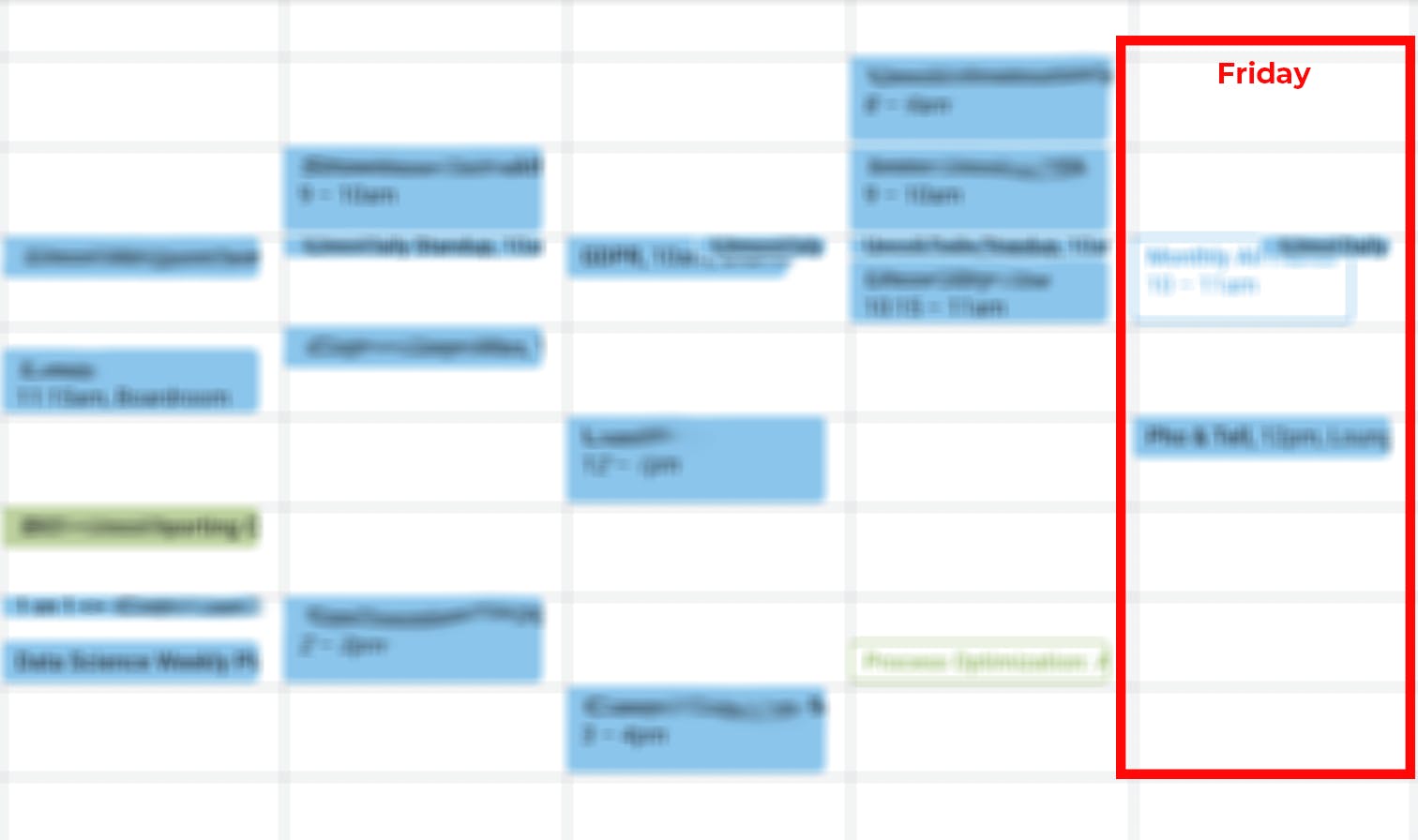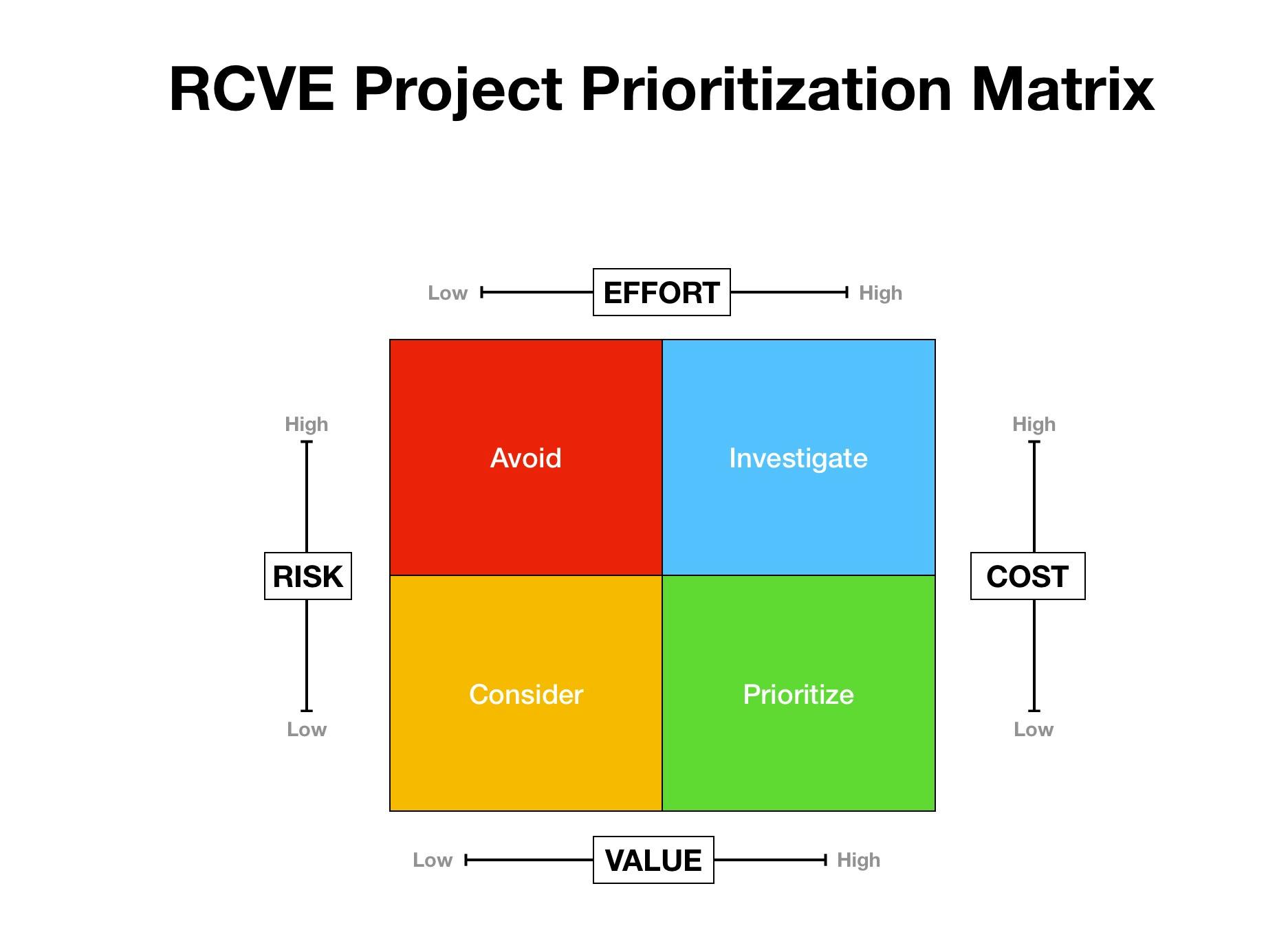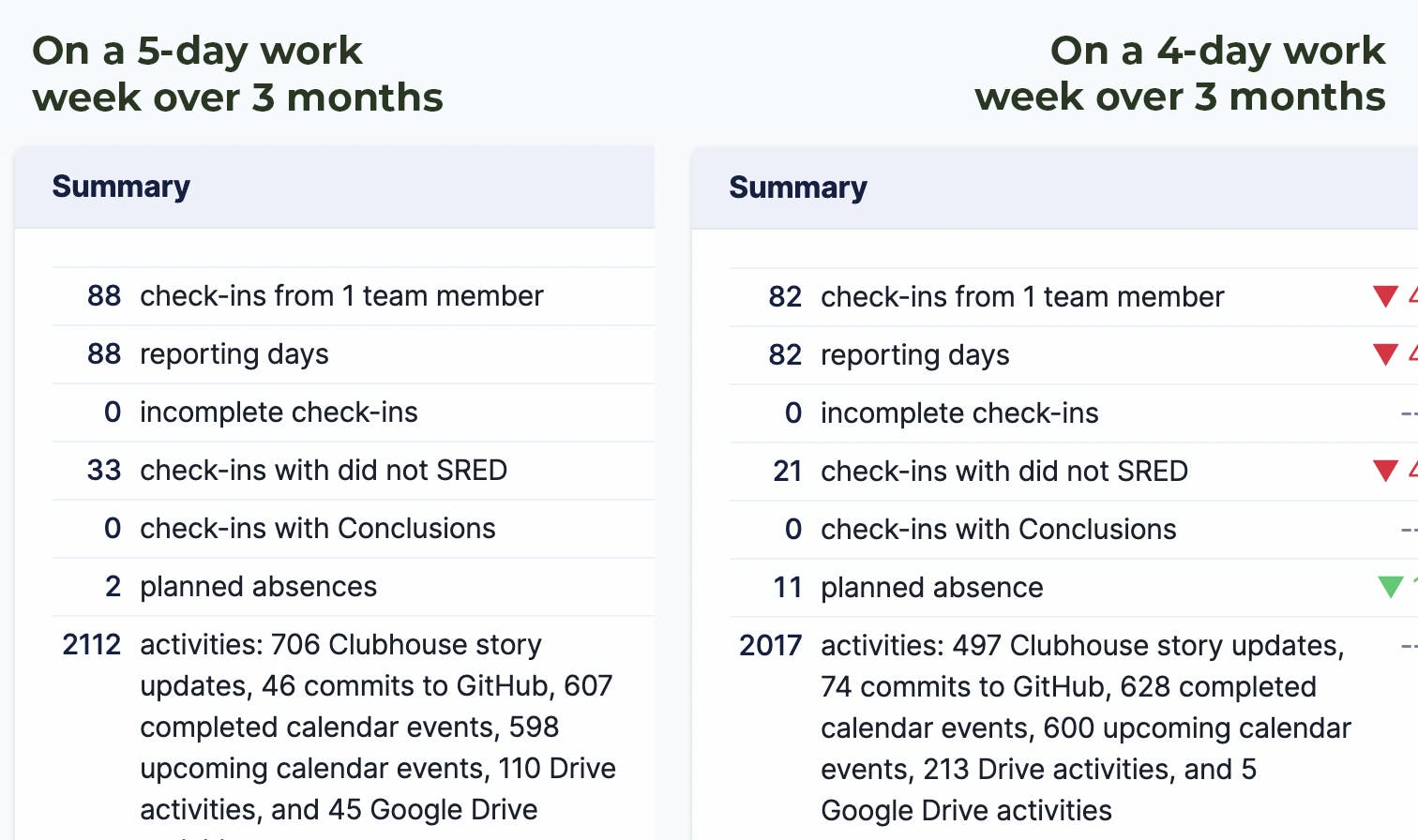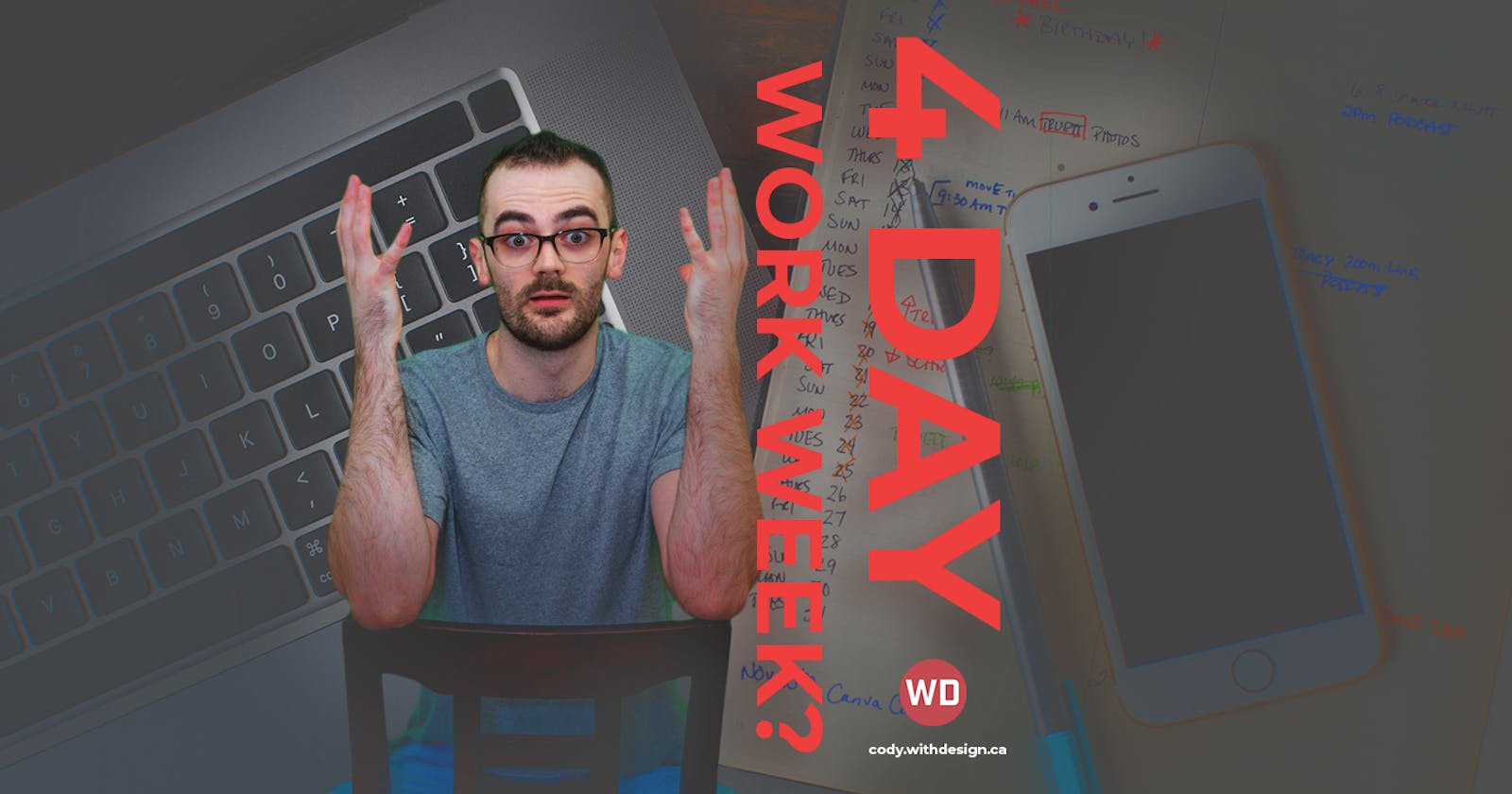An Honest Review From A Product Director; Test Driving a 4 Day Work Week For 3 Months
Find out how it optimized my workflow and provided new habits to add to my personal growth toolbelt.
Over the past 3 months, I have been test-driving a 4-day workweek. Instead of taking a week or two off work, I decided to take 1 day off a week. And so, I booked every Friday off for 3 months. "Give myself a short work week, why not right! Right?!" Inadvertently little did I know at the time, I was testing a 4 day work week. This was until my boss mentioned, "Hey, why don't you give us a little report on what you thought of a 4 day work week after this experience?". Then it clicked... I guess I am!
And if you know me, data tracking is somehow going to be involved...
A little background
I am currently a Director of Product, who manages an analytics mar-tech SaaS platform. Trust me when I tell you, things get crazy in eCommerce data at scale, especially when you are intaking and crunching all the numbers on our customer's behalf. The team is under 5 which excludes contractors. The company is very fast-moving, 1 day missed feels like a lifetime some days. My boss's only stipulation to the shortened workweek was for me to attempt to be as productive as possible to succeed in achieving the quarterly goals.
Here's an example of an average week based on scheduled meetings, anything in white is time to get shit done! So seems like I may have some time to fit in the extra daily work, Right?

What happened? How did it go?
In the first two weeks, I figured out quickly prioritization of time was key. My schedule always seemed all over the place with attempting to achieve this task and that task. I found it difficult to balance the number of meetings with elements of my required role with a lost day in the week. This challenge required reflection on how I could "make up" the lost time, without adding time. Oh, the riddle!
I began to document what I did hour by hour for a week. What I did, Where I went, What I ate etc. You name it I have the data point! Through this extensive exercise, I began to take notice of overlapping patterns in my activity I never pick up on before. Leading me to the hypothesis of, without a tight prioritization process and a deep understanding of how my mental and physical state works. Focused work would be difficult be achieve due to having a larger task list, which means more context switching.
By week four, I had a more refined process in place to begin iteration on over the coming eight weeks. What was this process you may ask? I would block my time in 20 min increments, working on that task for 20min (unless I planned a 40min session for it). At the end of the 20 min, I would stop and move on. Each day I would start and reevaluate if any tasks required reprioritization. I have always used the RCVE matrix and apply it to my day-to-day.

This matrix plus a kanban board worked wonders for me! I was able to cut out underlying tasks I may have wanted to do or seemed like a priority at first glance but weren't, and surface the ones I should do based on the analysis.
By week eight, I was powering through my objectives and tasks within the 4 day week. Noticing an increase in ease of completion, but a reduction of the time throughout the day to "think". Especially when it came to challenges that required out-of-the-box thinking.
By week ten, I began to notice I worked long hours each day (almost a full 1-2 hours) extra each day, especially when marketing is pushing users to the platform. Also, I had to be more reliant on the team to cover customer queries and responses on the Fridays I was off.
By week twelve, having Fridays off felt like the weekly routine. My workflows were streamlined with a better understanding of how I personally work. Support for the team on the day off seemed to be cover with a new process. With that, the 4-day week experiment comes to a close, with some success and many learnings. I began to reflect on how this 4 day work week has truly gone and produce a quick retrospective on my productivity based on some data collected.
Final productivity results

As you can observe, A small decrease in the number of activities, but overall stayed consistent when compared to the last 3 months of a 5-day workweek to a 4-day workweek. That's pretty great to see productivity was kept the same. But was the quality kept as high? As for that, I am confident in the quality and achieving the quarterly goals. But we will see when it comes to reviewing time.
The learnings
- Think of your time and brain energy as a daily currency. You only have so much to spend over the day, so using it decisively will provide more impact on your tasks.
- Always start the day by reviewing the previous day's priorities.
- Find a prioritization method that works best with your workflow. By documenting what I did hour by hour for a week helped me, identify the RCVE matrix, which worked best for my daily workflow.
- Think of time as blocks and schedule your days accordingly. There will always be variance, and that's ok.)
- Schedule time to think. I noticed that my creative energy was reduced unless I scheduled time for it, it's something that can be easily overlooked but can provide impact to glean proper success to your solutions.
- Use the 80-20 Rule for certain tasks. I found some tasks I did not need to make perfect. Does that wireframe need to be pixel perfect or can it be a bit off to still get the point across to the internal stakeholder? Eight times out of ten this will be the case.
- Understand how your "focus" works and schedule certain tasks at those "peak hours". How I like to think of it, is my brain is a battery - There is only so much energy it can output.
- Always leave yourself notes on where you left off. This will ensure you can hit the ground running the next day.
- Keep the weekend sleep schedule to only 2 of the 3 days. I found when you sleep in 3 days in a row, that Monday will seem like a struggle in the morning.
- Sticking to a consistent weekday routine will ensure high energy through the week. Once I reflected on my daily patterns, I built a routine that best supported the good patterns but deflects the bad patterns out of my day.
Recommendation
Pros
- Shorter week.
- Feel well-rested at the start of the week.
- Better feeling of work-life balance.
Cons
- No downtime to think more freely about the challenges you are solving.
- Takes longer to start the week and reacquaint with the tasks at hand.
- Prioritization of time takes skill through being self-aware, which takes time to learn. (And it's not easy at times.)
Overall
- If the expectation is to do a full of 40-hour workweek in 32 hours, some will not be able to achieve it easily. I took it upon myself to invest and understand how I could optimize my own workflows to streamline work and cut through the not as impactful activities. This is something that some could find a hard time committing to at times. It's always easier to be compliant than work to improve; Making it more so, by our nature to fall into, without taking note. If it was a regular 32 hours, well that be great!
- New processes should be put in place to ensure communication, status, and the success of the tasks and visibility across the team.
- Having an optimized workflow such as the one I strived for, requires an extra day of rest to fully recharge.
- An extra day made me actually relax. It was great! I had got one day with no chores or any required outings. Its the type of recharge you want!
- Some weeks are great, others are not, and that's ok. There are so many variables that fall into productivity. From your daily life, work, health, etc.
Closing thoughts
If I had the opportunity to have a 4 day work week, I would take it. I really enjoyed having the extra day through it purely providing a better work-life balance, even though I felt like I was working hard.
For this to work in a regular office or startup, I believe it will only work effectively in some industries. Software is one of them. Within this experiment, I was the only team member that was participating, which I believe created a different experience when compared to an experience, like the entire team taking a 4 day week.
My best recommendation is to try it out for yourself! Make sure you track the data points that are impactful with goal completion, mental state, overall productivity, and quality of work. These data points can be leverage during a retrospective to see if a 4 day work week is achievable for your team.
Good luck, have a great time experimenting!

